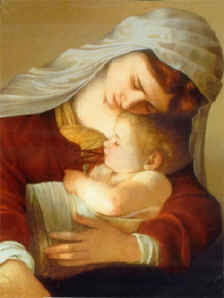 Readings: Num 6:22-27; Gal 4:4-7; Lk 2:16-21
Readings: Num 6:22-27; Gal 4:4-7; Lk 2:16-21
The gospels don’t give us a great deal of information about Mary, the mother of Jesus. However, the glimpses that they do give us can have great value. One passage about Mary that I have always personally liked very much was in today’s gospel selection: "Mary kept all these things, reflecting on them in her heart." There must have been many, many things about her son that led her to think deeply about who he was and what he was about. Mary presents to us a model of a deep, spiritually reflective person.
The Western European tradition all the way back to the ancient Greeks held the practice of reflective thinking in high esteem. The philosopher Socrates said, "The unexamined life is not worth living." After Socrates, Plato and Aristotle both considered metaphysics to be the highest of human activities. By reflective thinking they meant the mental effort to discern the exact causes of anything that happens, to see the relationships between things, to explore the effects of human actions and through all these kinds of examinations to understand the deeper meanings of things, people and events. And that’s what Mary did. She kept all the events of Jesus’ life, ministry and teaching in her heart and reflected upon them. Rightly does the Church call her "the first follower of Christ," and in this regard "the Mother of all the Church in the order of grace." (L.G. #61) It’s also why Mary is such an appropriate model for monastic men and women.
Deep reflection, Mary and monasticism go together. I think that’s one reason there’s so often a special devotion to Mary among monastic men and women and why there are so many Marian shrines at monasteries. I came across that in an unusual place the other day. I’m currently in the process of reviewing a book for the American Benedictine Review. The book is Gethsemani Homilies by Fr. Matthew Kelty, a monk of Gethsemani Abbey in Kentucky. In addition to the homilies there’s an extended question and answer interview with Fr. Matthew by the editor of the collection. Fr. Matthew was first ordained in 1946 as a Divine Word priest and spent fifteen years in missionary work, mainly in New Guinea, before joining the Cistercians. In the interview Fr. Matthew talks about the monastic life being so conducive to thinking deeply with its times of quiet and solitude. That’s something his active life as a missionary did not give him—time to reflect deeply. His life at Gethsemani did give him that opportunity that he so greatly desired.
Some of Fr. Matthew’s most interesting comments concerned vocations. (Fr. Matthew was 93 years old when he gave the interview.) In his view vocations to the monastic life have declined because more and more young people have never developed the capacity to think deeply. Their imaginations are overwhelmed by constant media input and output. "They get constant input....more and more of it from dawn to dusk. There is no silence, no time to ponder or reflect on anything and in that context religion dies." (p.xxxv) When you think about teenagers sending hundreds of text messages a day and receiving just as many----to say nothing of time spent on the phone, using computers, watching TV, listening to their iPods----you begin to understand why the reflectiveness necessary for this way of life is something they really have no experience of.
Mary, the mother of Jesus, remains a standard of holy, prayerful reflective thought. She should be that kind of an example for us. Let us celebrate her for that today.
Saturday, January 1, 2011
Fr. Matthias Neuman's Homily for the Solemnity of Mary
Subscribe to:
Post Comments (Atom)




No comments:
Post a Comment